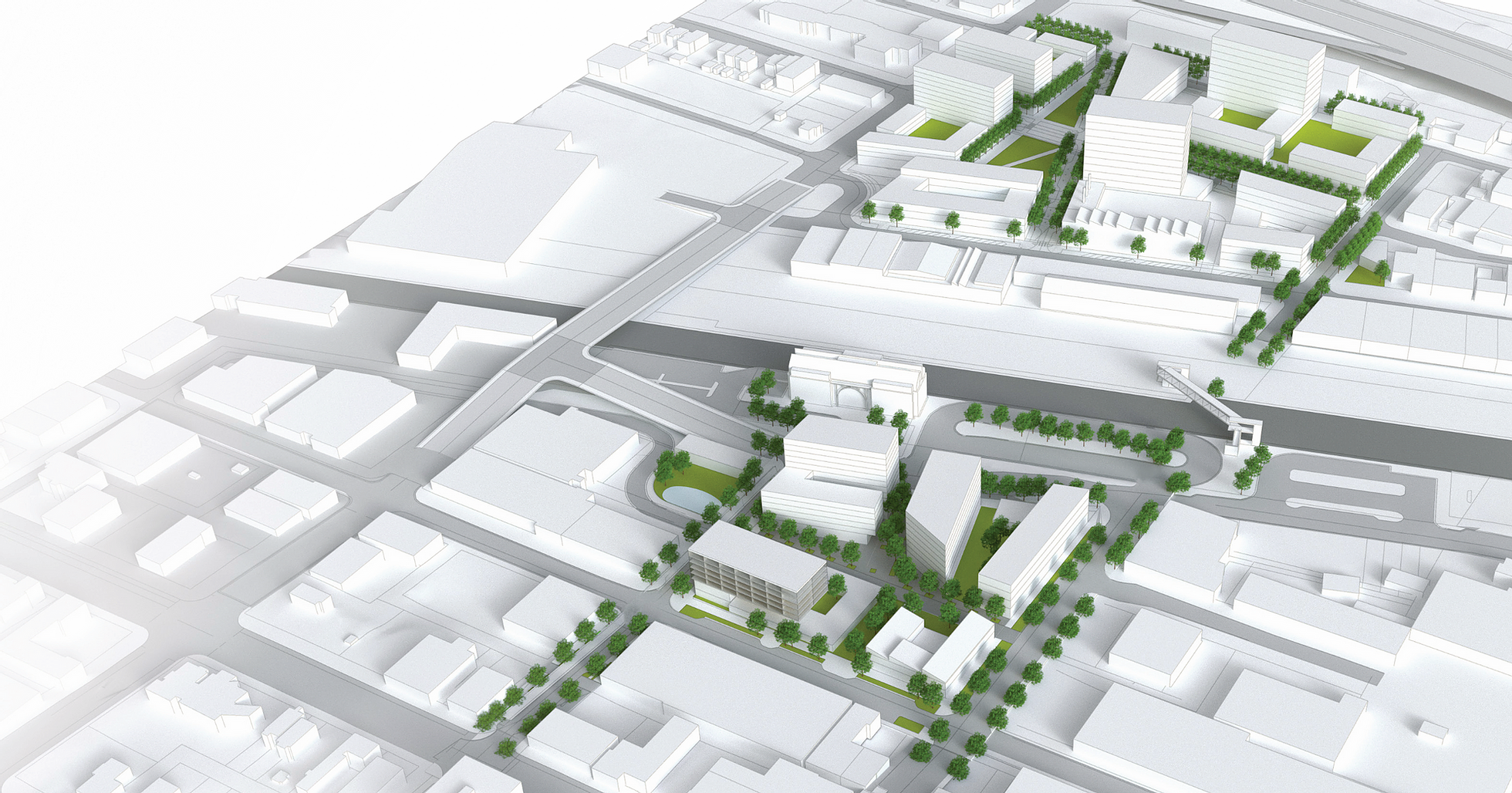
Convergence
Everett Station TOD Study
Report
Study Background
The neighborhood of Everett Station is a convergence zone of roads and transit, industry and commerce, community and history. Now it's time to prepare for the convergence of our past+present with the future.
With the City of Everett planning for 89,000 more workers and 87,000 more residents to call Everett home by 2050, and a continuing housing supply and affordability crisis, strategic efforts to capitalize future investments such as light rail are essential to Everett's future economic prosperity, environmental sustainability, and social equity.
The City has already established the neighborhood's zoning through the 2018 Metro Everett Plan, and Sound Transit is beginning its planning work for the future Everett Link Extension.
Building from this base, Housing Hope received funding from the Washington State Department of Commerce and J.P. Morgan Chase Foundation to study a potential opportunities for publicly-owned properties in the neighborhood to be proactively developed to meet the City's and region's needs. Of special interest to Housing Hope was developing an early childhood learning facility, administrative office, mixed income housing, community gathering spaces, and workforce development center.
In August 2020, Housing Hope contracted with a consultant team of Northwest Studio, Heartland Institute, MIG, and Nelson\Nygaard. The Everett Station District Alliance provided community and stakeholder engagement for the study. The report was published in May 2021.
Commissioned by Housing Hope and published in May 2021, the Convergence Study is a detailed analysis of how to build core components of a sustainable, equitable, and thriving neighborhood on publicly-owned properties while growing gracefully in a way that supports existing light industrial businesses in the Everett Station District.
3. Convergence Place
Promote the creation of a mixed-use, mixed-income, multi-generational focal point for the neighborhood, “Convergence Place,” centered on Park and Ride Lot A.
Develop a Parking Replacement Plan for the existing Park and Ride Parking.
Prepare a Request for Proposals for development partners and proponents and engage in a joint Public-Private-Partnership (PPP) development project.
Establish a Phasing and Partner Interaction strategy for partnering developers, project funders, and owner(s) and/or operator(s) of the project.
Study Sites
A Vision for the Study Sites
A neighborhood hub for green, equitable, and employment-focused economic development.
At Everett Station, the City can leverage the strength of the existing manufacturing and industrial business community, a large portfolio of publicly owned land, and planned investments in transit infrastructure to grow a resilient employment center, focused on green construction and next-generation clean energy industry jobs, together with support programs and services that allow working families to thrive—early childhood education, affordable housing within walking distance, healthy food options, and opportunities for job training and professional development.
A catalyst development can...
Protect and Stabilize Local Business
Accelerate Economic Development
Early Childhood Education
Flexible and Affordable Business Spaces
District-wide Improvement Services
Community-Oriented Common Spaces
Commuter Facilities
Enable Housing Choice
Achieve Climate Action Goals
Leverage Real Estate Value to Create Civic Value
Top 5 Actions Needed to Achieve Vision
1. City Plans & Policies
Update City plans and policies to support existing local light industrial and manufacturing businesses and promote new, green economy employment in the Everett Station neighborhood.
Overlay a responsive land use framework that helps to protect light industrial zoned land from future development pressure.
Create a Freight Master Plan that links local truck routes to a Citywide system.
Update the Bicycle Master Plan to expand the neighborhood’s mobility shed.
Revise the Metro Everett zoning code to better support active neighborhood industrial ground floor uses, small business, property improvements, and light industrial redevelopment.
2. Neighborhood-Specific Plans
With a focus on social, economic, and environmental equity and inclusion, develop neighborhood-specific plans for:
Public Realm and Placemaking, including the repurposing of the Everett
Station Employee Parking Lot north of 32nd, the transition of 32nd to a public plaza or shared streetspace, and the future creation Cedar Street Commons East of the tracks.Mobility, Station Access, and Transportation Demand Management, including the establishment of a roster of street types and a district-wide parking strategy.
Environmental Sustainability, in alignment with Climate Action Plan goals.
Neighborhood Business Collaboration, including the establishment of support services and programs that promote capacity building (social and capital); professional and trade growth; and local economic development.
Governance and Neighborhood Management
Project Funding, including strategies for leveraging district-wide financing such as LCLIP and TIF.
4. Green Loop
Implement a “Loop” of key public realm improvements that promote placemaking, multimodal access to the station, and environmental sustainability, including the extension of Paine Avenue through Park and Ride Lot A, a 32nd Street public plaza or shared street space, and a Station Green and Bike Hub on the surface lot North of 32nd Street, in concert with Metro Everett recommendations.
5. Cedar Street Campus
Establish a plan and solicit Requests for Expressions of Interest (RFEOI) for PPP development of the Public Works / Everett Transit Cedar Street Campus, east of tracks.
Proposed Planning & Development Timeline
Additional reports related to the Convergence Study
Urban Land Institute Report
As part of the Convergence Study, the Urban Land Institute formed a Technical Assistance Panel to provide additional insight into the project and produced a recommendations report.
UW Studio Report: Everett TOD Housing Study
A UW graduate-level class analyzed the return-on-investment for creating a housing benefit district for the Everett Station District.
ESDA’s Report on a Conceptual Everett Equitable Development Initiative Framework
As part of the Convergence Study, ESDA published a report that outlined best practices for equitable engagement for transit-oriented development.
UW Studio Report: Equitable Development Study for Everett Station Area
A UW graduate-level class analyzed equitable development programs across the country and made recommendations for the Everett Station District.





